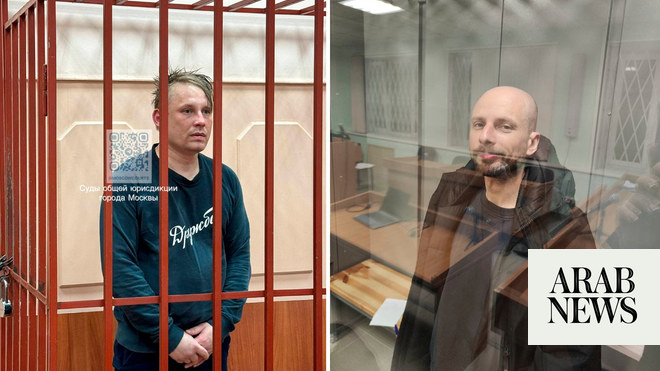
STOCKHOLM, Oct 4 (Reuters) - American scientists David Julius and Ardem Patapoutian won the 2021 Nobel Prize for Medicine on Monday for the discovery of receptors in the skin that sense temperature and touch and could pave the way for new pain-killers.
Their work, carried out independently, has helped show how humans convert the physical impact from heat or touch into nerve impulses that allow us to "perceive and adapt to the world around us," the Nobel Assembly at Sweden"s Karolinska Institute said.
"This knowledge is being used to develop treatments for a wide range of disease conditions, including chronic pain."
Patapoutian, who was born in 1967 to Armenian parents in Lebanon and moved to Los Angeles in his youth, learnt of the news from his father as he had been out of contact by phone.
"In science many times it is the things we take for granted that are of high interest," he said of winning the more than century-old prize, which is worth 10 million Swedish crowns ($1.15 million).
He is credited for finding the celular mechanism and the underlying gene that translates a mechanical force on our skin into an electric nerve signal.
"(For) us being in the field of sense, touch and pain, this was the big elephant in room where we knew they existed, we knew they did something very different," he said.
Patapoutian is a professor at Scripps Research, La Jolla, California, having previously done research at the University of California, San Francisco, and California Institute of Technology, Pasadena.
New York-born Julius, 65, is a Professor at University of California, San Francisco (UCFS), after earlier work at Columbia University, in New York.
His findings were inspired by his fascination for how natural products can be used to probe biological function and he used capsaicin, the molecule that makes chili peppers spicy by simulating a false sensation of heat, to understand the skin"s sense of temperature.
Professor Ardem Patapoutian of the Department of Neuroscience at Scripps Insitute, who won the 2021 Nobel Prize for Physiology or Medicine, poses in an undated photograph. Courtesy of Ardem Patapoutian/Handout via REUTERS
Thomas Perlmann, Secretary of the Nobel Assembly and the Nobel Committee, announces the winners of the 2021 Nobel Prize in Physiology or Medicine David Julius and Ardem Patapoutian (seen on the screen) during a press conference at the Karolinska Institute in Stockholm, Sweden October 4, 2021. T TT News Agency/Jessica Gow via REUTERS
Nobel Committee member Patrik Ernfors explains the 2021 Nobel Prize in Physiology or Medicine during a press conference at the Karolinska Institute in Stockholm, Sweden October 4, 2021. TT News Agency/Jessica Gow via REUTERS
1/6
Thomas Perlmann, Secretary of the Nobel Assembly and the Nobel Committee, announces the winners of the 2021 Nobel Prize in Physiology or Medicine David Julius and Ardem Patapoutian (seen on the screen) during a press conference at the Karolinska Institute in Stockholm, Sweden October 4, 2021. T TT News Agency/Jessica Gow via REUTERS
Julius hopes his work will help identify new strategies for treating chronic pain syndromes.
"We all know there"s a real lack of drugs and approaches to treat chronic pain," Julius said in a 2017 video posted on Youtube by UCSF. "I think we need some new insights and new ideas for treating pain, pharmacologically and other ways, and I think our work will contribute to that."
Jan Adams, chief science officer at German drugmaker Gruenenthal GmbH, which markets pain relief skin patches and creams based on the TRPV1 capsaicin receptor discovered by Julius, said his work had "opened up a whole new field of research for new non-opioid pain therapies".
SURPRISE AND SHOCK
Both laureates were caught off guard, according to the committee. Professor Thomas Perlmann, Secretary-General for the Nobel Assembly and the Nobel Committee for Physiology or Medicine, described them as "incredibly happy and as far as I could tell very surprised and a little bit shocked."
The prestigious Nobel prizes, for achievements in science, literature and peace, were created and funded in the will of Swedish dynamite inventor and businessman Alfred Nobel. They have been awarded since 1901, with the economics prize first handed out in 1969.
The Nobel Prize for Physiology or Medicine, shared in equal parts this year by the two laureates, often lives in the shadow of the Nobels for literature and peace, and their sometimes more widely known recipients.
But medicine has been thrust into the spotlight by the COVID-19 pandemic, and some scientists had suggested those who developed coronavirus vaccines could be rewarded this year or in coming years.
The pandemic continues to haunt the Nobel ceremonies, which are usually full of old-world pomp and glamour. The banquet in Stockholm has been postponed for a second successive year amid lingering worries about the virus and international travel. read more
($1 = 8.7272 Swedish crowns)












